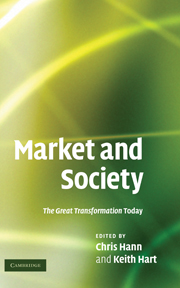Book contents
- Frontmatter
- Contents
- List of figures and table
- List of contributors
- 1 Introduction: Learning from Polanyi 1
- 2 Necessity or contingency: Mutuality and market
- 3 The great transformation of embeddedness: Karl Polanyi and the new economic sociology
- 4 The critique of the economic point of view: Karl Polanyi and the Durkheimians
- 5 Toward an alternative economy: Reconsidering the market, money, and value
- 6 Money in the making of world society
- 7 Debt, violence, and impersonal markets: Polanyian meditations
- 8 Whatever happened to householding?
- 9 Contesting The Great Transformation: Work in comparative perspective
- 10 “Sociological Marxism” in central India: Polanyi, Gramsci, and the case of the unions
- 11 Composites, fictions, and risk: toward an ethnography of price
- 12 Illusions of freedom: Polanyi and the third sector
- 13 Market and economy in environmental conservation in Jamaica
- 14 Embedded socialism? Land, labor, and money in eastern Xinjiang
- 15 Afterword: Learning from Polanyi 2
- Bibliography
- Index
13 - Market and economy in environmental conservation in Jamaica
Published online by Cambridge University Press: 08 August 2009
- Frontmatter
- Contents
- List of figures and table
- List of contributors
- 1 Introduction: Learning from Polanyi 1
- 2 Necessity or contingency: Mutuality and market
- 3 The great transformation of embeddedness: Karl Polanyi and the new economic sociology
- 4 The critique of the economic point of view: Karl Polanyi and the Durkheimians
- 5 Toward an alternative economy: Reconsidering the market, money, and value
- 6 Money in the making of world society
- 7 Debt, violence, and impersonal markets: Polanyian meditations
- 8 Whatever happened to householding?
- 9 Contesting The Great Transformation: Work in comparative perspective
- 10 “Sociological Marxism” in central India: Polanyi, Gramsci, and the case of the unions
- 11 Composites, fictions, and risk: toward an ethnography of price
- 12 Illusions of freedom: Polanyi and the third sector
- 13 Market and economy in environmental conservation in Jamaica
- 14 Embedded socialism? Land, labor, and money in eastern Xinjiang
- 15 Afterword: Learning from Polanyi 2
- Bibliography
- Index
Summary
Karl Polanyi's position in economic anthropology is odd. His essay “The Economy as Instituted Process” (Polanyi 1957b), and the collection in which it appeared (Polanyi, Arensberg, and Pearson 1957), were central to the main intellectual dispute in the sub-discipline, the formalist–substantivist debate in the 1960s (see Isaac 2005; Wilk 1996: 3–13). At the same time, The Great Transformation (Polanyi 1944) has had little influence. There are good reasons for this imbalance. The essay speaks of orders and processes of the sort that anthropologists commonly see in their field research, while the book describes something rather different, changes in Britain and Europe over almost two centuries. The scope of these changes is alien to the more circumscribed focus of conventional anthropology, which makes the book less accessible than the essay.
Though perhaps less accessible, the book should be useful. The changes it describes revolve around a growing stress on the self-regulating market free from interference by the state, on the expansion of the market to areas of life hitherto outside of it, and on the medium of the market, money, as the measure of value and the motive for market actors. These are very much the neoliberalism that, for the past decade or two, has increasingly been the political-economic milieu of the people and situations that anthropologists study.
- Type
- Chapter
- Information
- Market and SocietyThe Great Transformation Today, pp. 240 - 255Publisher: Cambridge University PressPrint publication year: 2009



